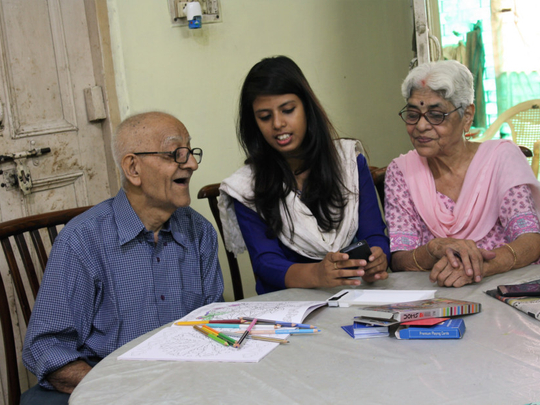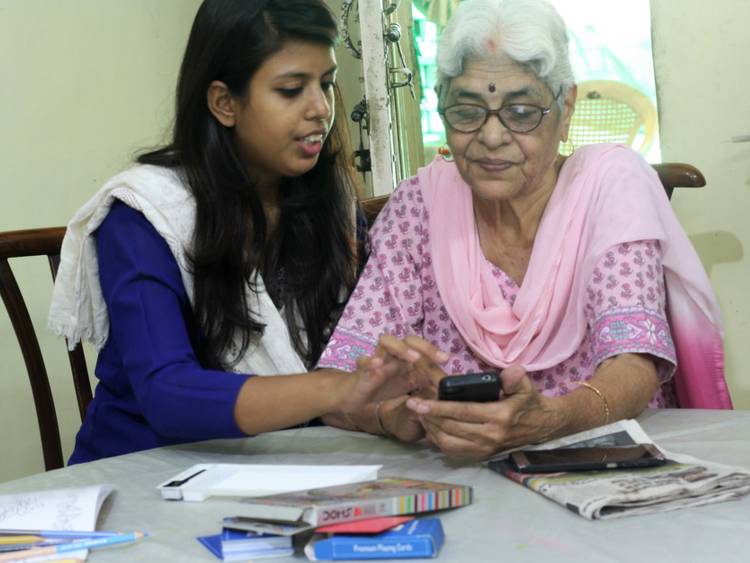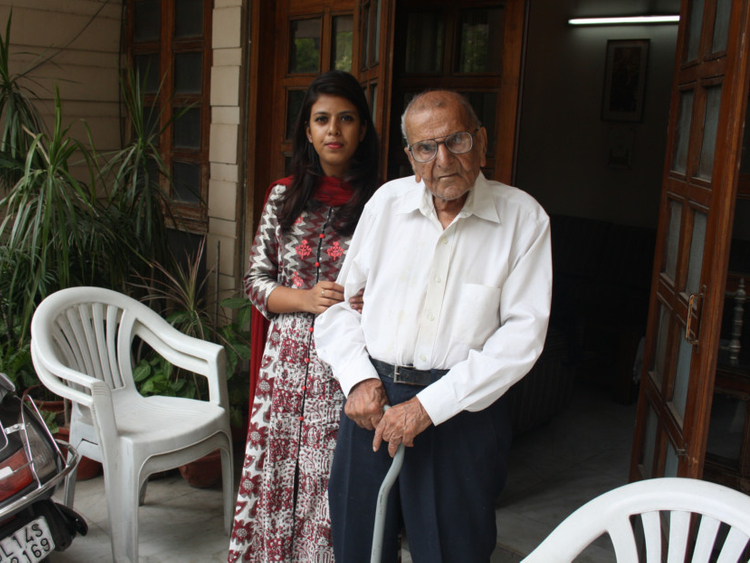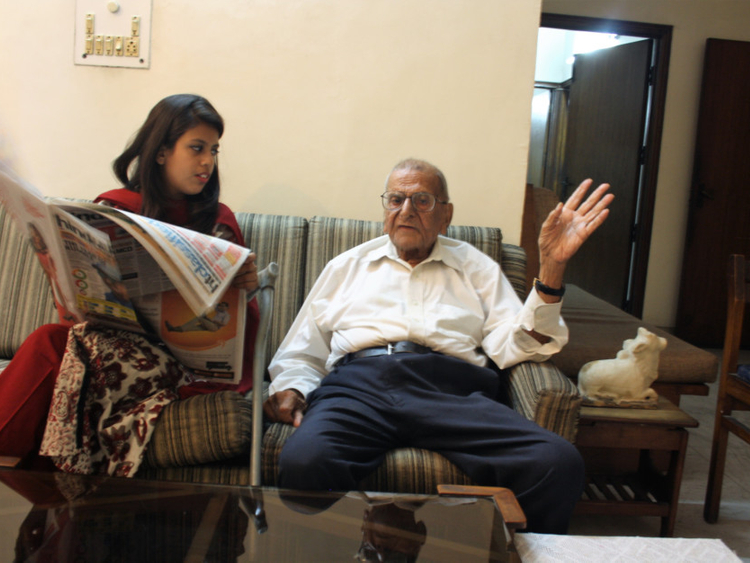
Seated to the left of Mangho Rattanchand Laljani, 87, on a worn-out sofa, Sidra Tul Muntaha reads out headlines of an English newspaper. Subsequently, the two hold a discussion on current political and global events.
A while later, Sidra guides Laljani for a session of yoga for his hands and feet, along with some breathing exercises. She keeps her manner easy and her tone positive all along, meticulously avoiding any reference to his condition — age-related macular degeneration (ARMD).
She even accompanies Laljani on his visits to the bank or the hospital, helps in sorting out his personal papers and makes phone calls on his behalf. As a senior care specialist with Samvedna Senior Care, a company providing paid companionship to elderly people in Delhi and cities surrounding it, Sidra, 23, knows what the job demands of her.
She has been visiting Laljani, a retired Indian Railway Accounts Service executive director, and his wife Shanta, for two hours thrice a week since February this year.
Hired by Laljani’s younger son Narendra, who lives in the United Kingdom, Sidra’s main task is to help the elderly couple stay in touch with the present. Laljani’s long-term memory is intact but he is afflicted by short-term memory loss which often means that he drifts back to the days of Partition, the division of British India in 1947 which led to the creation of two separate nations, India and Pakistan, that was followed by a frenzy of violence and bloodshed that left thousands of families fleeing to safety across the border from either side.
It is Sidra’s job to make sure that the octogenarian keeps off the painful and negative memories of the past. Laljani’s family had to migrate from Sindh in Pakistan to India under extremely fraught conditions.
Laljani’s elder son, Ravindra, is settled in the US. Though he, along with his wife, has been to the UK and the US eight times, they now stand disqualified from air travel.
Hard of hearing, Laljani uses a hearing aid, his vision is poor and he uses a stick to move around in the house but his happiness at having Sidra around is clear. He has even discovered what they share in common. “Both of us are masters in social work (MSW). We discuss that too,” he says sitting in his bungalow near a major railway station in east Delhi.
The case with Surinder Nath Sarin and Santosh Sarin, who reside in a sector of Old Gurgaon, is similar to the Laljanis. They too have Sidra assisting them.
“Sidra is a big help. She takes me to a doctor, helps me identify playing cards and colour drawings,” says Surinder Nath, 77, who retired as a Grade-I scientist from the Indian Meteorological Department (IMD). His wife Santosh credits the girl for having taught her how to use WhatsApp. The application has helped her to stay in constant touch with her sons Vivek and Pankaj, in the US. Pankaj came across Samvedna Senior Care on the internet in October last year when his mother was hospitalised after a fall. “When I was in hospital, my husband called up Pankaj. He came to know about Samvedna Senior Care and engaged Sidra,” says Santosh.
Surinder Nath and Santosh have visited their sons five times in the past but now, too old to travel such long distances, wait for their sons to visit India (which is not too frequently) or chat with them on WhatsApp.
“On Father’s Day, Vivek sent a message to his father,” says Santosh, reading it out.
Sidra says that playing cards and colouring drawings help provide Surinder Nath with cerebral stimulation as he suffers from moderate dementia.
Archana Sharma, founder and managing director of Samvedna Senior Care, says the initial objective of her organisation was to provide emotional care to senior citizens. But it has gradually added dementia care to its portfolio.
According to Samvedna Care’s brochure, out of 36 million dementia patients in the world, 3.7 million are in India and in the next 20 years, 75 per cent of the dementia population would live in developing countries like India.
Ankur Saxena, an expert in psychological counselling and hypnotherapy with Samvedna, uses proverbs and quizzes to keep one of his clients, an octogenarian in Faridabad, entertained.
‘An apple a day keeps the doctor…..’ he recites, exhorting the bedridden engineer to fill in the blanks. The engineer gleefully repeats the line and suffixes the word ‘away’ to it. Despite the big age difference between them, he calls Ankur his “dost” (friend).
Saxena plays scrabble and crossword with the engineer’s wife. He visits the couple for an hour in the evenings, three days of the week. He takes tea with the them and often sings old Hindi film songs with them to keep them entertained. The couple has three daughters, two of whom live in India and the third in the US.
Specialist staff
Samvedna Senior Care’s staff of seven care specialists is a mix of clinical psychologists and trained social workers. All of them are young and paid employees unlike Maya CARE, a network in Mumbai and Pune whose caregiver volunteers are a motley mix of college students, homemakers, working professionals and active citizens.
Maya CARE began as a foundation in 2009 but over the years has turned into an NGO due to lack of funds. “Our volunteers accompany the clients to doctors, temples and social and cultural functions and also spend time talking with them. Giving them company is our primary service,” says Pratyusha Pinnali, a project manager with Maya CARE.
Among the other services listed by the NGO are writing letters, making an affidavit, applying for passport and visa, booking gas and telephone connection, printing emails, scanning and emailing documents, videos, conducting bank transactions, delivering library books, shopping for gifts, groceries, tickets and prayer material. Maya CARE volunteers are also supposed to water plants when their client’s family is away.
Founded by Vidya Gokhale, a retired professor of pharmacology, Maya CARE has 50 volunteers registered in Mumbai. In Pune, the number is over a dozen. Most of its clients are retired senior citizens whose children are either settled abroad or in other places within India.
A large number of these senior, retired citizens are wheelchair-bound, and many of them have never married.
Makarand Nimonkar, a former employee of Women Economic Development Corporation, a semi-state government body, and a Maya CARE volunteer in Pune, caters to Sharad Phadnis, 65, a bachelor who lives in an old age home. Nimonkar, 61, visits him every day for an hour and a half. The two sexagenarians have been meeting for three years and struck up an emotional bond.
“Phadnis calls me up if I do not reach on time. He has got used to my presence. I take him around for a walk; buy medicines and other essential goods. I sing songs for him. And I even gift him sweets on his birthday and festivals,” Nimonkar told Weekend Review by phone.
Phadnis, who is wheel chair-bound, calls Nimonkar says he loves his company. “He is my friend. I like him a lot,” he says haltingly in broken Hindi.
Ageing population
According to India’s last population census in 2011, 8.6 per cent of country’s total population was above 60 years. A recent report — ‘Caring for Our Elders: Early Responses: India Ageing 2017’ — of United Nations Population Fund (UNFPA) estimates that India’s population of 60 years and above will be 12.5 per cent by 2030. It is likely to reach 300 million by 2050. The UNFPA estimates that 213.9 million of these will have one or more chronic ailments.
Fortunately, the number of organisations offering voluntary or paid companionship to senior citizens is also rising.
Prasad Bhide, founder of Aaji Care, a company providing home care services in Mumbai, says the number of corporate entities offering senior care is growing at around 15 per cent annually. “A number of major players like Dabur are entering this field,” Bhide says.
Besides providing geriatric care, Aaji Care offers nursing visits, physiotherapy services and health care attendants. It has 50 paid companions in its database. Bhide attributes the high growth in the sector to the disintegration of the joint family system in the country. “Moreover, the percentage of working couples has increased,” he points out.
Aaji Care was set up in August 2012 thanks to Bhide’s personal experience. Bhide was a chemical engineer employed in IT sector in the US when his mother was admitted in a hospital. Soon after he returned to India, he decided to set up an elder care home.
He says the objective of his organisation is to provide preventive care and emergency management to the elderly along with the respect such services deserved. “Care services are looked down in our society. We are working to give it dignity,” he says.
Apart from the above entities, HelpAge India also provides volunteers for senior care. The NGO operates a recreation centre for old people in South Delhi.
Reverse swing
Interestingly, it is not the elderly people alone who benefit from the young looking after them. More often than not, the young care givers also benefit.
Laljani, for instance, has been pushing Sidra to appear for the Union Public Service Commission (UPSC) examination, India’s competitive entry portal to join the elite administrative services. “You have the potential. You must attempt it at least once,” he tells her everyday.
Narendra Kaushik is a writer based in India















